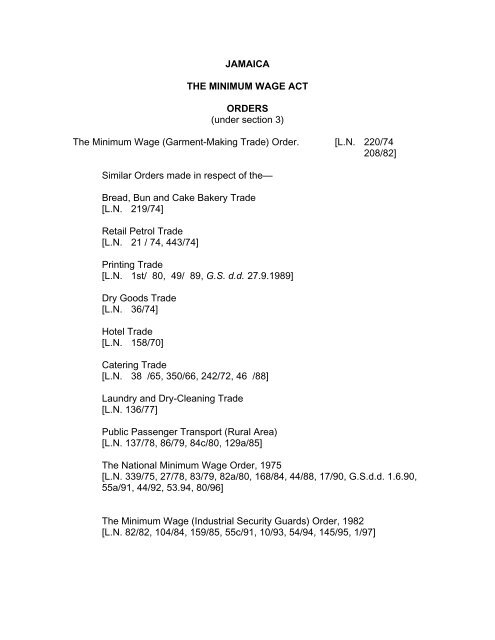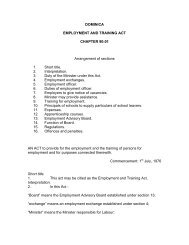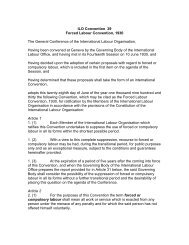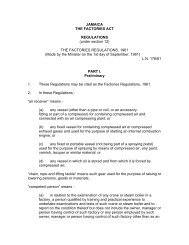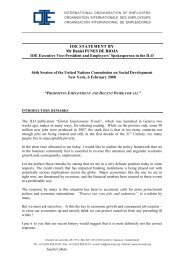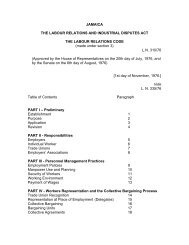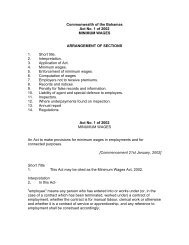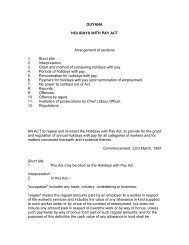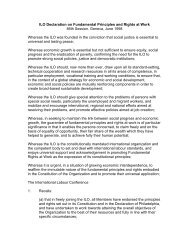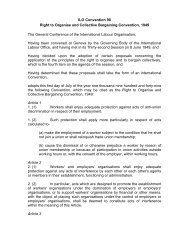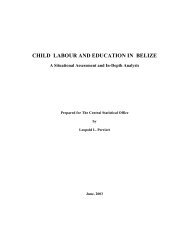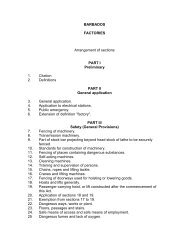JAMAICA THE MINIMUM WAGE ACT ORDERS (under section ... - ILO
JAMAICA THE MINIMUM WAGE ACT ORDERS (under section ... - ILO
JAMAICA THE MINIMUM WAGE ACT ORDERS (under section ... - ILO
You also want an ePaper? Increase the reach of your titles
YUMPU automatically turns print PDFs into web optimized ePapers that Google loves.
<strong>JAMAICA</strong><strong>THE</strong> <strong>MINIMUM</strong> <strong>WAGE</strong> <strong>ACT</strong><strong>ORDERS</strong>(<strong>under</strong> <strong>section</strong> 3)The Minimum Wage (Garment-Making Trade) Order. [L.N. 220/74208/82]Similar Orders made in respect of the—Bread, Bun and Cake Bakery Trade[L.N. 219/74]Retail Petrol Trade[L.N. 21 / 74, 443/74]Printing Trade[L.N. 1st/ 80, 49/ 89, G.S. d.d. 27.9.1989]Dry Goods Trade[L.N. 36/74]Hotel Trade[L.N. 158/70]Catering Trade[L.N. 38 /65, 350/66, 242/72, 46 /88]Laundry and Dry-Cleaning Trade[L.N. 136/77]Public Passenger Transport (Rural Area)[L.N. 137/78, 86/79, 84c/80, 129a/85]The National Minimum Wage Order, 1975[L.N. 339/75, 27/78, 83/79, 82a/80, 168/84, 44/88, 17/90, G.S.d.d. 1.6.90,55a/91, 44/92, 53.94, 80/96]The Minimum Wage (Industrial Security Guards) Order, 1982[L.N. 82/82, 104/84, 159/85, 55c/91, 10/93, 54/94, 145/95, 1/97]
Notices(<strong>under</strong> <strong>section</strong> 11)The Minimum Wage (Occupation Record) (Retail Petrol Trade) Notice. 1974[L.N. 22/74]Similar Notices issued in respect of the—Bread. Bun and Cake Bakery Trade[L.N. 46/55]Hotel Trade[L.N. 157/70]<strong>THE</strong> <strong>MINIMUM</strong> <strong>WAGE</strong> <strong>ACT</strong><strong>ORDERS</strong>(<strong>under</strong> <strong>section</strong> 3)<strong>THE</strong> <strong>MINIMUM</strong> <strong>WAGE</strong> (GARMENT-MAKING TRADE) ORDER, 1974(Made by the Minister on the 10th day of May, 1974)[L.N. 220/74]Amdt.L.N. 208/85][20th May, 1974.)1. This Order may be cited as the Minimum Wage (Garment-MakingTrade) Order, 1974.2. In this Order—“casual worker” means a worker whose total period of employment in any weekin any garment-making establishment does not exceed eighteen hours;
“garment-making establishment” means an establishment in which the garmentmakingtrade is carried on whether exclusively or in addition to any other trade orbusiness;“garment-making trade” means the trade or business of making ormanufacturing, altering or repairing garments, whether for profit or not;“overtime work” means work done—(a)during any period on a rest day;(b) during any period on any Sunday, public general holiday, GoodFriday or Christmas Day;(c)during any period in excess of eight hours on any standard day;“rest day” means in relation to a worker such day of the week as may beexcluded from single-time work in respect of such worker;“single-time work” means work (not being done on any Sunday, public generalholiday. Good Friday or Christmas Day) done during any period not exceeding—(a)eight hours on any standard day;(b) forty hours in any one week of five standard days andshall not include work done on a rest day;“standard day” means in relation to a worker, any day of a week (excludingSunday) which is not a rest day in respect of such worker;“various categories of workers” means the various categories defined inSchedule B;“wage” means wage received in money. exclusive of ancillary benefits;“week” means the period commencing immediately after twelve o’clock midnighton each Saturday and ending at twelve o’clock midnight on the Saturday nextfollowing;“worker” means a worker of any category specified in the first column ofSchedule A and defined in Schedule B.3. (1) Subject to sub-paragraph (2) in respect of employment in thegarment-making trade—
(a) the minimum wage payable to a worker in any category specified inthe first column of Schedule A in respect of single’ time work done by himin any week shall be the sum specified in the second column of theaforesaid Schedule in respect of such worker:Provided that a worker who fails to do single-time work for a period of fortyhours in any week by reason of not presenting himself for work orabsenting himself from the establishment without the permission of hisemployer or wilfully refusing to work shall be paid such sum as is arrivedat by dividing the sum specified in the said Schedule by forty andmultiplying the result by the number of hours of single-time work done byhim;(b) the minimum wage payable to a worker of any category specified inthe first column of Schedule A in respect of any overtime work done byhim in any week shall be such sum as is arrived at by dividing the sumspecified in the second column of the said Schedule in respect of suchworker by forty and multiplying the result thereof by twice the number ofhours of overtime work done by such worker in the case of work done onany Sunday, public general holiday. Good Friday or Christmas Day or byone and one-half times the number of such hours in any other case;(c) the minimum wage payable to a casual worker in respect of workdone in any week shall be such sum as is arrived at by dividing the sumspecified in the second column of Schedule A in respect of a workersimilarly employed and multiplying the result thereof by one and one-thirdtimes.3. (2) Where a worker is employed in more than one category by reasonof the fact that the work at the garment-making establishment at which he worksdoes not justify his employment on one particular task only, he shall be paidwage at the minimum rate fixed for the higher or highest of the categories inwhich he is employed,4. Nothing in this Order shall be construed as preventing the paymentof wage at a rate higher than the minimum rates specified herein.SCHEDULE A(Paragraph 2)Minimum single-time rates per week of forty hours ingarment-making establishments
Category of WorkerWageWarehouse Foreman $110.00Cutter $106.00Spreader $ 91.00Sewing Machine Operator $ 90.00Sewing Machine Operator Trainee $ 85.00Presser and Finisher $ 86.00Storeman $ 90.00Miscellaneous Worker $ 86.00Mechanic $118.00Mechanic Trainee $ 86.00Maintenance Worker $ 93.00Office Maid $ 85.00Messenger $ 85.00(i) Miscellaneous Workers include: Floor Girls, Floor Helpers, Packers,Wrappers, Trimmers.(II) The period of training for any trainee should not exceed twelve weeks.SCHEDULE B(Paragraph 3)DEFINITION OF <strong>THE</strong> VARIATION CATEGORIES OF WORKERSEMPLOYED IN <strong>THE</strong> GARMENT-MAKING TRADEWAREHOUSE FOREMANCUTTERSPREADERMACHINE OPERATORPRESSER/FINISHERA worker who exercises supervising authorityover all the workers in a warehouse m additionto any other work which may be required ofhim.A worker who is primarily engaged in cuttinggarments by hand/machine.A worker whose primary duty is to spreadcloth in layers on the cutting table for cutting.A worker whose primary duty is to operate asewing machine for the making of garments orparts thereof.A worker who is primarily engaged in finishinga garment, viz, turning a seam; cutting threads,making loops; attaching buttons, press-studs.etc.; or final pressing.
STOREMAN A worker primarily engaged in the handlingand distribution of stores.MECHANICMAINTENANCE WORKERMAIDMESSENGERA worker who is in charge of the maintenanceand repair of any or all of the equipment andmachinery in the Factory.A worker who assists generally ‘in maintenancebut is not responsible for the operationof mechanical or electrical Machinery.A worker primarily engaged in work of adomestic nature in the establishment And whomay be required to run errands.A worker who performs the duties of amessenger.[2nd November, 1975.)NATIONAL <strong>MINIMUM</strong> <strong>WAGE</strong> ORDER, 1975(Made by the Minister on the 22nd day of October, 1975)L.N. 339/75Amdt.L..N. 27/7383/7982a/80168/8444/8527/90G.S. d.d.1.6.199055A/9144/9253/9480/96Citation.1. This Order may be cited as the National Minimum Wage Order,1975.
Interpretation.2. In this Order, unless the context otherwise requires—“household worker” means a worker employed to work in a private place ofresidence;“normal working day” means, in relation to any worker, any day on which thatworker is normally required to work for his employer but does not include—(a)(b)a rest day; ora public holiday;“public holiday” means—(a) any day which <strong>under</strong> the provisions of any enactment for the timebeing in force is, or is declared to be, oris proclaimed as, a public general holiday; and(b)Good Friday and Christmas Day;“rest day” means, in relation to any worker, the day allowed to that worker inaccordance with paragraph 3 as a rest day;“wage” means remuneration in money and does not include the value of—(a)(b)any lodgings or food supplied; orany other benefit conferred,to or on any worker by his employer;“week” means the period commencing immediately after twelve o’clock midnighton each Saturday and ending at twelve o’clock midnight on the Saturday nextfollowing;“worker” means an individual who has entered into, or works <strong>under</strong>, a contractwith an employer, whether the contract is express or implied, and (if it is express)whether it is oral or in writing, and includes any individual employed aboard anyaircraft registered in Jamaica or aboard any ship registered in Jamaica, but doesnot include—(a) any individual employed <strong>under</strong> a contract of apprenticeship which isregistered <strong>under</strong> the Apprenticeship Act: or
(b) any student registered or enrolled at any educational institutionrecognized by the Minister responsible for education and employed duringany vacation granted by that educational institution: or(c) any individual employed in such basic school or day care centre orsheltered workshop as may be recognized by the Minister for the purposeof this definition; or(d) any individual performing work which is a part of his training in anyinstitution certified by the Minister to be a vocational training institution; or(e)any individual—(i)certified by the Minister to be a learner; and(ii) performing, in a place of employment specified in theMinister’s certificate, work which is a part of that individual’s trainingduring a period of training specified in that certificate; or(f) any individual employed by the Government or by the Kingston andSaint Andrew Corporation or any Parish Council <strong>under</strong> the Special LabourIntensive Employment Project for the Relief of Unemployment.3. (1) Every employer shall. in each week during which any worker, otherthan an hourly worker as defined in paragraph 5, works for him, allow that workerone day as a rest day.3. (2) The day on which the rest day of any worker is to fall in anyparticular week shall be determined by agreement between that worker and hisemployer.National minimum wage.4. Subject to the provisions of paragraph 8, with effect from the 1stday of July. 1996, the national minimum wage for workers, other than householdworkers, is hereby fixed at the rate of—(a) 520.00 per hour for work done by such workers during any periodnot exceeding—(i)(ii)8 hours on a normal working day; or4Ohours.inanyweek;
(b) $30.00 per hour for work done by such workers during any period inexcess of 8 hours in a normal working day or in excess of 40 hours in anyweek;(c) $40.00 per hour for work done by such workers during any periodon a rest day or on a public holiday.Minimum wage for household workers.5. (1) Subject to the provisions of paragraph 8. with effect from the 1stday of July, 1996, the minimum wage for household workers who are employedas weekly workers is hereby fixed at the rate of—(a) $800.00 per week for work done by household workers whosenormal working week is 40 hours, and $30.00 per hour for work doneduring any period in excess of such 40 hours in any week;(b) $820.00 per week for work done by household workers whosenormal working week Is 41 hours, and $30.00 per hour for work doneduring any period in excess of such 41 hours in any week;(c) $840.00 per week for work done by household workers whosenormal working week is 42 hours, and $30.00 per hour for work doneduring any period in excess of such 42 hours in any week;(d) $860.00 per week for work done by household workers whosenormal working week is 43 hours, and $30.00 per hour for work doneduring any period in excess of such 43 hours In any week;(e) $880.00 per week for work done by household workers whosenormal working week is 44 hours, and $30.00 per hour for work doneduring any period in excess of such 44 hours in any west(f) $40.00 per hour for work done by such household workersduring any period on a rest day or on a public holiday.5. (2) Subject to the provisions of paragraph 8, with effect from the 1stday of July, 1996, the minimum wage for household workers who are employedas hourly workers is hereby fixed at the rate of—(a) $20.00 per hour for work done by such workers during any periodnot exceeding 8 hours on any day other than a public holiday;(b) $30.00 per hour for work done by such workers during any period inexcess of $ hours on any day other than a public holiday;
(c) $40.00 per hour for work done by such workers during any periodon a public holiday.5. (3) In this paragraph—“hourly workers” means workers who, by agreement with their employers,normally work for less than 40 hours per week for any one employer;“normal working week” means the number of hours in each week during whichthe weekly worker in relation to whom such period is specified is normallyrequired to work for his employer, but does not include any period on a rest dayor on a public holiday;“weekly workers” means household workers who, by agreement with theiremployers, regularly work for not less than 40 hours per week for any oneemployer.Workers shall be paid for waiting time, etc.6. (1) Any period during which any worker, acting on the instructions ofhis employer, waits at his work place in order to be available to perform any ofhis duties whenever he is required to do so shall be reckoned, for the purposesof paragraph 4 or 5 as the case may require, as a period during which work isdone by that worker.6. (2) Where a casual worker reports for duty at his work place on anyday in accordance with the instructions of his employer and the provisions of subparagraph(1) do not apply as a result of any special circumstances of the case,that worker shall be deemed, for the purposes of paragraph 4 or 5, as the casemay require—(a) to have worked 4 hours on that day if he is not required to do anywork or if the number of hours for which he is required to work is not morethan 4; or(b) to have worked for 8 hours if the number of hours for which he isrequired to work is more than 4 but less than 8.6. (3) For the purposes of sub-paragraph (2) “casual worker” means anyworker who is employed—(a) from day to day; orOffences.(b) for the performance of a particular task which normally cannot beperformed in less than one working day.
7. Any employer who—(a) contravenes the provisions of sub-paragraph (1) of paragraph (8);or(b) deducts from the wages of any worker any amount for lodgings orfood supplied by him to that worker or for any other benefit conferred byhim on that worker,shall be guilty of an offence and be liable on summary conviction before aResident Magistrate to a fine not exceeding one hundred dollars and in default ofpayment to imprisonment for a term not exceeding three months.Savings.8. (1) Where any order (other than this Order) made <strong>under</strong> the Act fixes inrespect of any worker a minimum wage of which the hourly rate is higher than thehourly rate of the minimum wage fixed in respect of that worker by this Order, thehourly rate of the minimum wage fixed by that order shall apply in respect of thatworker instead of the hourly rate of the minimum wage fixed by this Order.8. (2) Nothing in this Order shall be construed as preventing the paymentof wages at rates higher than the rates fixed by this Order and all contracts ofemployment subsisting at the 2nd November, 1975, at such higher rates shallcontinue to be valid.8. (3) For the avoidance of doubt, no worker shall be paid less than therates of wages fixed by this Order.<strong>THE</strong> <strong>MINIMUM</strong> <strong>WAGE</strong> (INDUSTRIAL SECURITY GUARDS) ORDER, 1982(<strong>under</strong> <strong>section</strong> .3)(Made by the Minister on the 29th day of September, 1982)L.N. 82/82Amdt.L.N. 104/84159/8555c/9110/9354/94145/951/97
(1 st of October. 1982.)1. This Order may be cited as the Minimum Wage (Industrial SecurityGuards) Order, 1982.2. In this Order, unless the context otherwise requires—“industrial security guard” means a worker who—(a) is employed by any person engaged in the business of protectingother persons or their property from injury or theft; and(b) at such times and places as his employer requires him so to do,guards any person or property;“normal working day” in relation to any industrial security guard means any dayon which that security guard is normally required by his employer to work, butdoes not include—(a)(b)a rest day; ora public holiday;“public holiday” means—(a) any day which <strong>under</strong> the provisions of any enactment for the timebeing in force is or is declared to be or is proclaimed as a public generalholiday; and(b)Good Friday and Christmas Day;“rest day” means in relation to any industrial security guard, the day allowed tothat security guard in accordance with paragraph 3 as a rest day;“wage” means remuneration in money and does not Include the value of—(a)any lodgings or food supplied; or(b) any other benefit conferred, to or on any industrial security guard byhis employer;
“week” means the period commencing immediately after twelve o’clock midnighton each Saturday and ending at twelve o’clock midnight on the Saturday nextfollowing.3. (1) The employer of an industrial security guard shall, in each weekduring which he works for that employer, allow him one day as a rest day.3. (2) The day on which the rest day of any industrial security guard is tofail in any particular week shall be determined by agreement between thatsecurity guard and his employer.4. With effect from the 6th day of January, 1997, the minimum wagefor industrial security guards is hereby fixed at the rate of—(a)$40.50 per hour for work done during any period not exceeding—(i)(ii)8 hours on a normal working day: or40 hours in any week:(b) $60.75 per hour for work done during any period in excess of 8hours on a normal working day or in excess of 40 hours in any week:(c) $81.00 per hour for work done during any period on a rest day or apublic holiday.5. Any period during which an industrial security guard, acting on theinstructions of his employer, waits at any place in order to be available to performany of his duties whenever he is required to do so shall be reckoned, for thepurposes of paragraph 4, as a period during which work is done by that securityguard.6. (1) With effect from the 6th day of January. 1997. and subject to theprovisions of sub-paragraph (2), the employer of an industrial security guard shallpay to that industrial security guard, in addition to the minimum wage specified inparagraph 4—(a) a laundry allowance at the rate of $7.00 for each hour of work doneby that industrial security guard;(b) a firearm premium allowance of $8.00 for each hour of work doneby that industrial security guard;(c) a dog holder’s premium allowance of $3.00 for each hour of workdone by that industrial security guard with a dog.
6. (2) The allowances referred to in sub-paragraph (1) shall not bepaid for any period of work in excess of 40 hours in any week.7. (1) An industrial security guard who satisfies the conditions specified insub-paragraph (2) shall be granted by his employer a holiday with pay of 3normal working weeks in lieu of the holiday with pay of 2 normal working weeksprescribed by the Holidays with Pay Order, 1973.7. (2) The conditions referred to in sub-paragraph (1) are—(a) the industrial security guard must have been employed, for not lessthan 5 years immediately before the commencement of the holiday withpay, to the employer by whom the holiday with pay is being granted; and(b) during the qualifying year in respect of which the holiday with pay isbeing granted, the industrial security guard must have worked on morethan 220 days for his employer.7. (3) In this paragraph “normal working week” and “qualifying year” havethe same meanings respectively as in the Holidays with Pay Order, 1973.8. With effect from the 6th day of January, 1997, the employer of anindustrial security guard shall—(a) cause that industrial security guard to insure his life in the sum offour hundred thousand dollars with double indemnity protection bothduring and outside his hours of work; and(b) pay the premiums in respect of that insurance while that securityguard remains in his employment.9. Any employer who deducts from the wages of any industrial securityguard any amount for lodgings or food supplied by him to that securityguard or for any other benefit conferred by him on that security guard shall beguilty of an offence and be liable on summary conviction before a ResidentMagistrate to a fine not exceeding one hundred dollars and in default of paymentto imprisonment for a term not exceeding three months.10. Nothing in this Order shall be construed as preventing the paymentof wages at rates higher than the rates fixed by this Order.
<strong>THE</strong> <strong>MINIMUM</strong> <strong>WAGE</strong> (OCCUPATION RECORD)(RETAIL PETROL TRADE) NOTICE, 1974(<strong>under</strong> <strong>section</strong> 11)(Made by the Minister on the 15th day of January, 1974)L.N. 22/74[21st January, 1974.}1. This Notice may be cited as the Minimum Wage (OccupationRecord) (Retail Petrol Trade) Notice, 1974.2. In this Notice, the expressions “initial period”, “petroleum fillingstation”, “petroleum lubricating station”, and “retail petrol trade” shall have therespective meanings assigned to them by the Minimum Wage (Retail PetrolTrade) Order.3. (1) Every employer in the retail petrol trade who operates a petroleumfilling station is hereby required to keep the occupation record specified in Part Iof the Schedule.3. (2) Every employer in the retail petrol trade who operates a petroleumlubricating station is hereby required to keep the occupation record specified inPart II of the Schedule.SCHEDULE(Paragraph 3)OCCUPATION RECORD (RETAIL PETROL TRADE)Name of petroleum filling stationPART IRecord of quantities of petrol and diesel oil soldAddress of petroleum filling stationName of proprietorName of manager
Grade of filling station:Grade:(Applicable only where the initial period commences on or after the 21 st January,1974, and only until the end of the initial period in respect of the petroleum fillingstation concerned)Estimated grade of filling station as estimated by the employer during the initialperiod (or first portion of twelve weeks thereof) commencing on19 :Grade:Quantity (in Gallons) of Petrol and Diesel Oil SoldWeekendingSun. Mon Tues. Wed. Thurs Fri Sat. Total Total from1 st April lastProceedingSignature ofproprietor, manageror other authorizedpersonPART IIRECORD OF NUMBERS OF MOTOR VEHICLES LUBRICATEDName of petroleum lubricating station:Address of petroleum lubricating station:Name of proprietor:Name of manager:Grade of lubricating station:(Applicable only until the end of the initial period of the petroleum lubricatingstation concerned.)Estimated grade of lubricating station as estimated by the employer during theinitial period (or first portion of twelve weeks thereof) commencing on:19 Grade:
Numbers of motor vehicles lubricatedWeekendingSun. Mon Tues. Wed. Thurs Fri Sat. Total Total from1 st April lastProceedingSignature ofproprietor, manageror other authorizedperson. .


